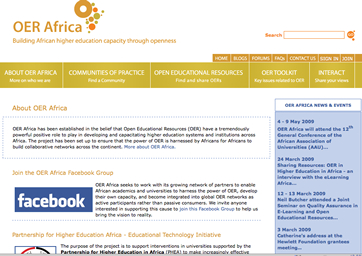Open Educational Resources (OER)
Open educational resources (OER) are "digitized materials that are offered freely and openly for educators, students and self-learners to use and re-use for teaching, learning, and research." OER are extremely important for assisting developing nations to get online programs up and running easily and quickly - and within the small budget that they are often working with.
Click on the links to get information on:
- UKOU's Open Educational Resources
- "Creativity and the Law" video by Larry Lessig
- The benefits and challenges of using OERs
- A list of OER websites
- The 2nd edition of the Theory and Practice of Online Learning available as a free e-book.
Creative Commons OpenEd Website
Though people and projects across the OER community frequently work together, there is no single "community" to join. Creative Commons has now created an "OpenEd" site for the Open Education Community.
The site invites you to feel free to sign up for an account on the site and edit wiki pages of interest, as well as joining the listserv. Or browse the other projects and participate there. There is a section for the "Open Ed Community" where you can share information of interest to the community, as well as identify and coordinate with peers and collaborators from across this international movement. There is a also section specifically for "Teachers", that tells you about producing, using and finding OER; a section for "Learners", that covers using finding and participating in OER creation; and a section on how to "Find OER".
OER initiative in Africa
Educational institutions in developing countries generally do not have the finances for large scale development of course materials, but if all the institutions contribute a bit and share in the development of materials, then big strides can be made. This is the philosophy of Open Educational Resources (OER).
Here is a new OER initiative in Africa and this is what their website has to say:
OER Africa was launched as an innovative new project, under the auspices of the South African Institute for Distance Education (SAIDE). This pan-African project is headquartered in Nairobi, Kenya, and envisioned to play a leading role in driving the development and use of Open Educational Resources (OER) within higher education across the African continent. OER Africa was established in the firm belief that OER has a powerful positive role to play in developing and capacitating higher education systems and institutions across Africa. This conviction is matched by concern that – if the concept and practice of OER evolves predominantly outside and for Africa – then African higher education will not be able to liberate its potential for itself. Thus, OER Africa has been set up to ensure that the power of OER is harnessed by Africans for Africans by building collaborative networks across the continent. The premise of OER Africa is that it will facilitate the aggregation of information and human expertise that produces knowledge – an activity which can either be individual, or inter-institutional. In order to continually test this premise, OER has not only developed an action research Agenda, but also sought the counsel and support of an Advisory Group of experts in various aspects of higher education. Seed funding has been provided by the William and Flora Hewlett Foundation, a Foundation which has successfully supported the development of a number of open educational resources initiatives such as the MIT OpenCourseWare in the United States.
OpenLearn
OpenLearn (the UKOU's Open Educational Resources repository) has seen over 2 million people take advantage of free education since it was launched in October 2006. You can download these resources, modify them, and use them in your teaching - as long as you acknowledge the source of the material and also allow others to use your resources in the same way.
Some of the study units available:
- The incredible shrinking chip
- Funding elite sports
- Improving aerobic fitness
- Business organisations and their environments: Culture
- Project management
- Company law in context
- Getting started with SPSS
- Real functions and graphs
- Mathematical language
- Campaigns and organisations
- Introduction to international development management
- Creativity, community and ICT
- Healthcare technology management
Creativity and the Law
Larry Lessig is one of our foremost authorities on copyright issues. In a time when "content" is not confined to a film canister, Lessig has a vision for reconciling creative freedom with marketplace competition. No expert has brought as much fresh thinking to the field of contemporary copyright law as has Lawrence Lessig. A Stanford professor and founder of the school’s Center for Internet and Society, this fiery believer foresaw the response a threatened content industry would have to digital technology -- and he came to the aid of the citizenry. As corporate interests have sought to rein in the forces of Napster and YouTube, Lessig has fought back with argument and with solutions: He chairs Creative Commons, a free licensing scheme for individual creators.
In the video below, Lessig gets the audience to their feet, following this elegant presentation of "three stories and an argument." He pins down the key shortcomings of our dusty, pre-digital intellectual property laws, and reveals how bad laws beget bad code. Then, in an homage to cutting-edge artistry, he throws in some of the most hilarious remixes you've ever seen.

